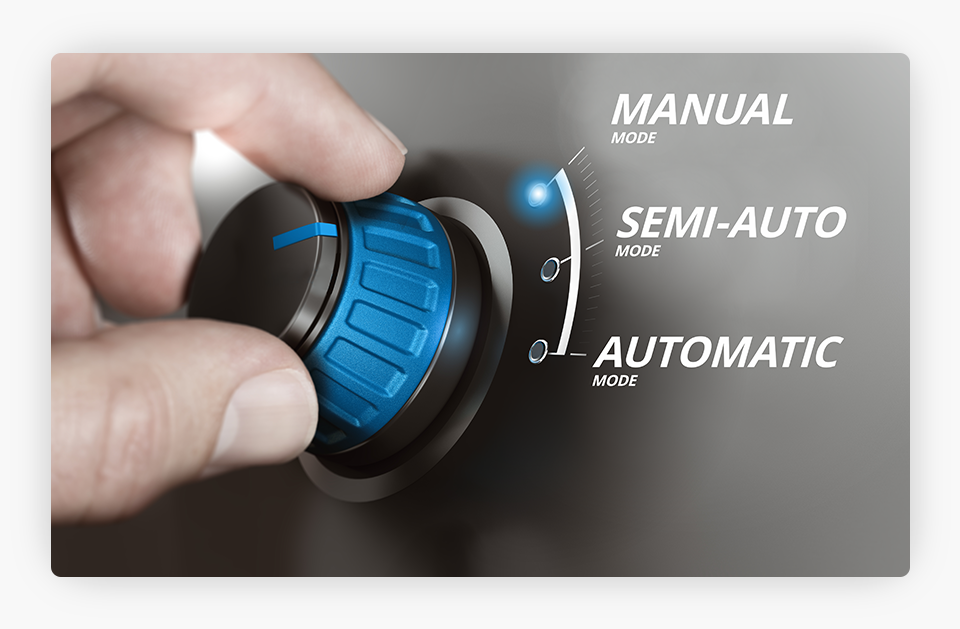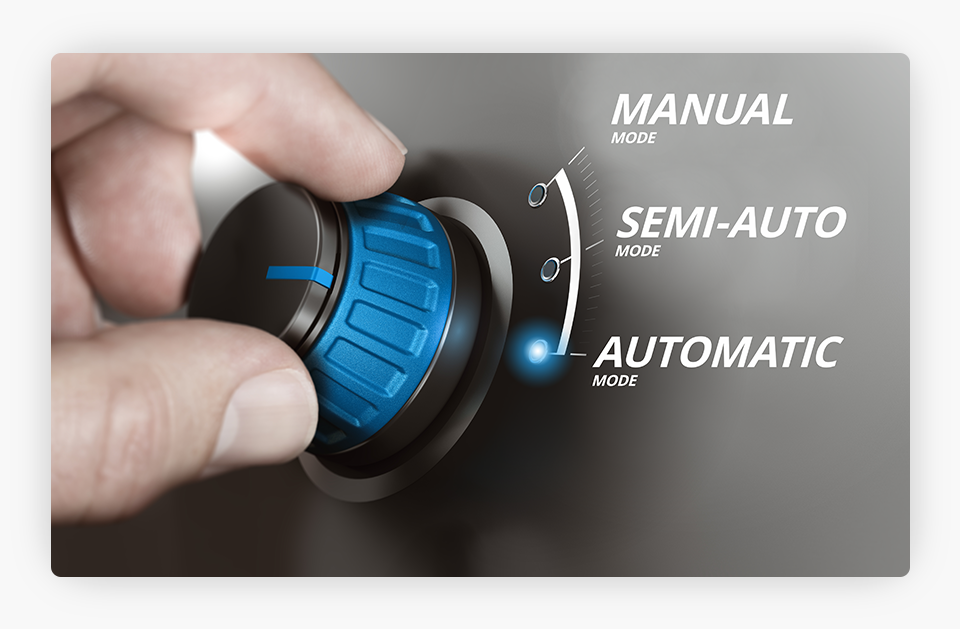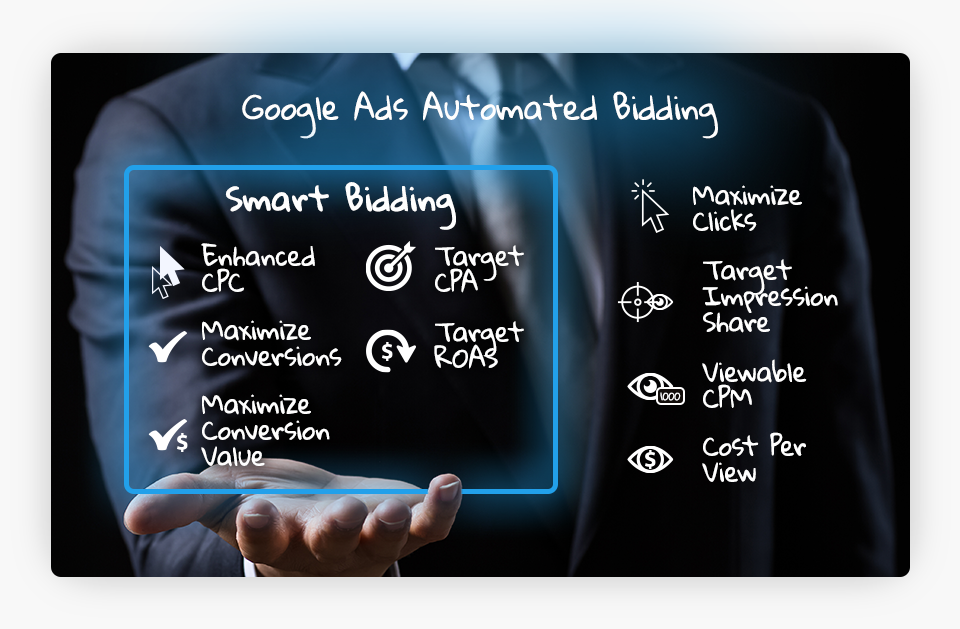We can’t send you updates from Justia Onward without your email.
Unsubscribe at any time.
Which bidding strategy should lawyers utilize to get the most out of their Google Ads PPC campaigns? The answer depends on the particular goals of your practice. Keep reading to learn more.
When it comes to pay-per-click (PPC) advertising, lawyers may be in the dark about which bidding strategy to pick out of the numerous options available. While not exhaustive, this article will provide an overview of manual and automated bidding strategies for Google PPC Search Ads. Keep in mind that implementing the right bidding strategy is just one aspect of building a successful campaign. You also need to start with a solid foundation and make sure you are properly tracking conversions so that you can measure the effectiveness of your campaign.
Watch this video to learn more about bidding strategies.
Manual Bidding Strategies

Manual Cost-Per-Click (CPC) Bidding
Goal: Control your bids.
Let’s start with the basics. With manual CPC bidding, you can set the maximum cost-per-click (CPC) for your ads. This can be a great starting point for new advertisers.
Benefits:
- You have control over the maximum amount you pay for each click.
- You start by setting the max CPC (aka “default bid”) for the entire ad group. However, if you find certain keywords tend to convert higher quality leads, you can also make separate bids for individual keywords.
- You can use “First-page bid estimates” or “Top of page bid estimates” to help guide your bids.
- You can set bid adjustments to increase or decrease your max CPC for searches occurring on mobile devices or in specific locations.
Considerations:
- It requires time to manage individual bids and determine which keywords are more profitable for your business.
- You’re making decisions based on the limited performance data that is available to you. With an automated bidding strategy, you can leverage Google’s vast amounts of data and auction-time signals to help optimize performance. While this doesn’t necessarily mean that manual strategies are bad and automated strategies are good, it is worth considering in the long run.
As mentioned, Manual CPC bidding can be a good starting place so you can get the hang of Google Ads. Plus, you can always adjust your bidding strategy in the future as your goals change.
Automated Bidding Strategies

When you are setting up your campaigns, Google will automatically choose an automated bid strategy for you based on your goals. Instead of proceeding with Google’s selection, you may choose any of the automated bidding strategy options discussed below, or you can choose to bid manually as described above.
Enhanced Cost-Per-Click (ECPC)
Goal: Get more conversions with automatic bid adjustments.
ECPC will automatically adjust your manual bids for clicks based on their likelihood to result in a conversion on your landing page or website. This is very similar to manual CPC bidding, and could be more accurately described as a “semi-automated” bidding strategy.
Benefits:
- ECPC will try to keep your average CPC below the max CPC you set (including bid adjustments).
- You can still maintain control over your max CPC.
- As a form of Smart Bidding, this strategy leverages Google’s wide array of auction-time signals to help optimize your performance.
- You can optimize for conversions or conversion value.
Considerations:
- While ECPC will try to keep your average CPC below the max you set, your average CPC may exceed your max CPC for short periods of time.
- While considered a Smart Bidding strategy, it isn’t as robust as other Smart Bidding strategies available.
This can be a good choice for advertisers who are looking to test automated bidding for the first time. You can get your feet wet, so to speak, while maintaining a higher level of control over your max CPC compared to other automated bidding strategies.
Maximize Clicks
Goal: Get the most clicks for your budget.
Maximize clicks is a fully automated bidding strategy that, as the name suggests, sets your bids to get you the max amount of clicks possible for your budget.
Benefits:
- This is a good strategy to build more volume if you’re driving more clicks to a landing page or website where you have a high rate of conversion.
- You can set a max CPC bid limit to help control the max amount you’re willing to pay for each click. Note: Any bid adjustments are applied on top of your max CPC bid limit.
Considerations:
- Keep an eye on your average CPC, especially if you don’t set a max CPC bid limit. The Google Ads system will bid aggressively to spend your daily budget.
Maximize Clicks can be a good strategy to help you build volume for your campaign, whether that be for branding purposes or driving more clicks to a high-converting landing page. That said, there may be better long-term strategies available, depending on your campaign goals.
Maximize Conversions
Goal: Get the most conversions for your budget.
This strategy is similar to Maximize Clicks but is focused on conversions rather than clicks. Maximize Conversions is an automated bidding strategy that will set your bids to help you get the most conversions possible for your given budget.
Benefits:
- Uses advanced machine learning to automatically optimize bids and offers auction-time bidding capabilities that tailor bids for every auction. Note: If you switch to Maximize Conversions, you don’t need to remove existing bid adjustments since they won’t be used.
Considerations:
- With this bidding strategy, conversion tracking is especially important to accurately evaluate your performance over time.
- If you’re currently spending less than your daily budget amount, switching to Maximize Conversions could significantly increase your spend.
- You can use the budget simulator tool to understand the budget opportunities for your campaign.
Target Cost Per Action (CPA)
Goal: Increase conversions while targeting a specific cost per action.
You have the option to set a Target CPA within your Maximize Conversions bid strategy. When you do this, Google will try to get as many conversions as possible within the Target CPA you set.
Considerations:
- Some conversions may cost more than your target and some may cost less, but Google Ads will try to keep your cost per conversion equal to the target CPA you set. For example, if you choose a target CPA of $20, Google Ads will automatically set your bids to try to get you as many conversions at an average of $20.
- Set a reasonable target CPA given your budget. You can also check your recommendations in the Google Ads dashboard.
- You should have significant conversion data before implementing a target CPA.
Maximize Conversions can be a good strategy if your goal is to get more conversions at a lower cost. You can obtain more control by implementing a target CPA to help keep your costs in check.
Maximize Conversion Value
Goal: Maximize the conversion value of your overall campaign.
Similar to Maximize Conversions bidding, this is an automated bidding strategy that uses advanced machine learning to automatically optimize and set bids. You will need to set up the value you want to maximize, such as sales revenue or profit margins, when you set up conversion tracking for your account.
Benefits:
- Like Maximize Conversions, this strategy has auction-time bidding capabilities to optimize bids for every auction.
Considerations:
- Before you can use Maximize Conversion Value bidding, you’ll also need to set up conversion tracking with transaction-specific values. You can adjust your conversion values with conversion value rules for higher value types of customers, devices, or locations.
Target Return on Ad Spend (ROAS)
Goal: Maximize conversion value while targeting a specific revenue goal.
You also have the option to set a target ROAS within your Maximize Conversion Value bid strategy. This bid strategy analyzes and intelligently predicts the value of a potential conversion every time a user searches for products or services you’re advertising.
Considerations:
- Be cautious about setting bid limits (minimums and maximums) which could restrict your performance.
- Make sure you have significant conversion volume (as with target CPA).
- Remember, you can start with a slightly lower target ROAS and increase it over time.
Maximize Conversion Value can be a good strategy in some cases if you want to take Maximize Conversions one step further.
Target Impression Share
Goal: Increase visibility.
Target Impression Share bidding is an automated bidding strategy that sets your bids with the goal of showing in one of 3 placements: 1) at the absolute top of the page, 2) top of the page, or 3) anywhere on the page of Google search results. Google automatically sets your bids to show your ad based on your placement settings. For example, if you choose an Impression Share Target of 80% on the absolute top of the page, Google Ads will automatically set your bids to help show your ads on the absolute top of the page 80% of the total possible time the ads were eligible to be displayed.
Benefits:
- Can be helpful for branding purposes and visibility.
- Allows you to be very specific in terms of impression share target and placement on the page. Note: It is very rare to get a 100% impression share target.
Considerations:
- Keep an eye on your CPC, but be cautious about setting a max CPC bid that is too low. It could negatively impact your performance.
- Existing bid adjustments will not be used, though you can still set mobile bid adjustments.
Is Smart Bidding the Same as Automated Bidding?

In short, Smart Bidding is a type of automated bidding, but not all automated bidding strategies are considered Smart Bidding strategies. Smart Bidding strategies use a wide range of auction-time signals in Google’s system, such as browser, location, and time of day to tailor bids to the unique context of each search.
The following bidding strategies (also discussed above) are considered Smart Bidding strategies:
- ECPC
- Maximize Conversions
- Target CPA
- Maximize Conversion Value
- Target ROAS
Smart Bidding offers four key benefits:
- Advanced machine learning, where powerful algorithms leverage their vast data to optimize your campaign performance.
- Wide range of contextual signals, such as device and location and other signals exclusive to Smart Bidding.
- Flexible performance controls, such as customizing settings for your particular business goals.
- Transparent performance reporting, such as bid strategy reports.
Which Bidding Strategy Is Right for You?

With so many bidding strategies available, it can be understandably overwhelming to pick the one that is best for your business. When choosing a bidding strategy, you should think about your law firm goals first. Do you want to drive as many clicks as possible to your landing page? Are you trying to increase the visibility of your brand? You also have the flexibility to set a bid strategy at the ad group, campaign, or portfolio level (across multiple campaigns) depending on the desired strategy.
It’s also important to make sure that you have enough data to make your desired bidding strategy work (e.g., make sure that you have enough conversions in the past 30 days to set an effective target CPA). If you’re not there yet, you can utilize a different bidding strategy in the meantime to help build volume. Also, remember that you are unlikely to see success overnight. It will take time to grow your campaign.
Be sure to allow adequate time before assessing performance. Automated bidding strategies in particular are meant to perform over the long run and learn as they go. These strategies use the data about a bid’s performance to inform future bids. For example, your average CPC might increase and CPAs might fluctuate initially, but the CPA should stabilize over time. Your performance will tend to be more consistent when you have more conversion data.
Because automated and smart bidding strategies rely on Google to set your bids, it is a common misconception that you can have a hands-off approach. While these strategies may require less maintenance in some cases, they still require skilled marketers to make ongoing optimization updates and to evaluate performance. Monitoring your performance on a regular basis helps ensure your bidding strategy is still meeting your practice’s goals. There is always room to improve and fine-tune your campaigns!
Final Thoughts: Why Do You Care?
If you’re a lawyer investing in a Google Ads PPC campaign, or are considering doing so, you want to set your campaign up for success. While selecting the right bidding strategy is only part of what makes a successful campaign, it is important nonetheless. Your PPC consultant should have a strong understanding of the different bidding strategies that are available and how to use them to achieve your goals and grow your practice.
Need help selecting a PPC consultant to achieve your advertising goals? Check out our post on questions you should ask before choosing a PPC consultant for your practice.
Related Posts